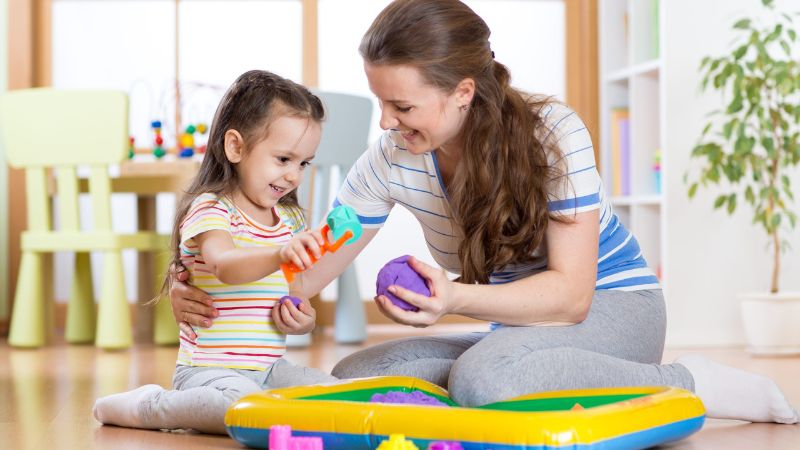In today’s fast-paced world, parents face a myriad of challenges when it comes to balancing work and family life. One of the most critical decisions they make is choosing the right type of childcare for their children. While daycare centers and nannies are popular choices, in-home childcare is increasingly gaining recognition for its numerous benefits. In-home childcare, which involves a caregiver coming to your home to look after your child, offers a unique blend of personalized care and convenience. This blog will explore nine compelling reasons why parents should consider in-home childcare, highlighting its advantages in terms of flexibility, individual attention, safety, and more.
1. Personalized Attention

One of the most significant benefits of in-home childcare is the personalized attention your child receives. Unlike daycare centers where caregivers are responsible for multiple children, an in-home caregiver focuses solely on your child. This one-on-one attention allows for a deeper understanding of your child’s needs, personality, and development. Personalized care can lead to better learning outcomes and emotional growth, as the caregiver can tailor activities and interactions to suit your child’s unique interests and developmental stage. Moreover, this individualized approach fosters a strong bond between the caregiver and the child, providing a sense of security and trust.
2. Customized Schedules
In-home childcare offers unparalleled flexibility in terms of scheduling. Unlike daycare centers that operate on fixed hours, in-home caregivers can adapt to the specific needs of your family. This is particularly beneficial for parents with irregular work hours, early morning meetings, or late-night shifts. The caregiver can arrive and leave at times that align with your work schedule, ensuring that your child is cared for without the stress of adhering to rigid drop-off and pick-up times. This flexibility also extends to accommodating last-minute changes, such as unexpected work commitments or personal appointments, providing parents with peace of mind.
3. Reduced Exposure to Illness
Another significant advantage of in-home childcare is the reduced exposure to illnesses. Daycare centers, with their large groups of children, are often breeding grounds for common childhood illnesses such as colds, flu, and stomach bugs. In-home childcare minimizes your child’s contact with other children, thereby decreasing the likelihood of catching contagious diseases. This can be especially important for infants and toddlers who have developing immune systems. By reducing the frequency of illnesses, in-home childcare not only ensures your child’s well-being but also minimizes the number of sick days parents have to take off work.
4. Familiar Environment
Children tend to feel more comfortable and secure in their own homes. In-home childcare allows your child to remain in a familiar environment, surrounded by their own toys, books, and comfort items. This familiarity can ease separation anxiety and make the transition smoother for both the child and the parents. Being at home also means that the child’s daily routine can be maintained more consistently, from naptimes to meal schedules. The consistency of being in a known environment supports emotional stability and can positively impact a child’s behavior and overall happiness.
5. Tailored Learning and Play

In-home childcare offers the opportunity for tailored learning and play experiences. Caregivers can design activities that align with your child’s interests and developmental needs. Whether it’s educational games, creative arts and crafts, or outdoor adventures, the caregiver can provide a stimulating environment that fosters learning through play. This personalized approach ensures that your child is engaged and challenged appropriately, promoting cognitive and motor skills development. Furthermore, caregivers can incorporate the child’s interests into their daily activities, making learning fun and effective.
6. Enhanced Safety and Supervision
Safety is a top priority for any parent, and in-home childcare provides an added layer of security. Your child remains in the safe and controlled environment of your home, where you can be assured that safety measures are in place. With fewer children to supervise, an in-home caregiver can provide more focused attention, reducing the risk of accidents and ensuring that safety protocols are strictly followed. Additionally, parents have the opportunity to vet and train the caregiver on specific safety practices relevant to their home and lifestyle, further enhancing the overall safety and well-being of their child.
7. Consistency and Stability
Children thrive on consistency and stability, which can be more easily achieved with in-home childcare. With the same caregiver providing care each day, your child benefits from a stable and predictable routine. This consistency helps build a secure attachment between the child and caregiver, which is crucial for emotional and social development. Unlike daycare centers where staff turnover can be high, an in-home caregiver can provide long-term stability, reducing the stress and anxiety that can come with frequent changes in caregivers.
8. Better Communication with Caregivers
In-home childcare facilitates better communication between parents and caregivers. The close working relationship allows for regular updates and detailed feedback about your child’s day-to-day activities, progress, and any concerns. Parents can have more meaningful conversations with the caregiver about their child’s development, behavior, and milestones. This open line of communication ensures that parents are well-informed and involved in their child’s care, leading to a more collaborative approach in addressing the child’s needs and fostering their growth.
9. Cost-Effective for Multiple Children

For families with multiple children, in-home childcare can be a more cost-effective option compared to daycare centers. While daycare fees typically increase with each additional child, in-home caregivers often charge a flat rate or a smaller incremental fee for additional children. This can result in significant savings for families. Additionally, the convenience of having all your children cared for at home eliminates the need for multiple drop-offs and pick-ups, saving time and reducing transportation costs. The personalized attention each child receives also ensures that they are all equally engaged and nurtured.
Conclusion
Choosing the right childcare option is a crucial decision for parents, and in-home childcare offers numerous advantages that can significantly benefit both the child and the family. From personalized attention and customized schedules to enhanced safety and better communication, the benefits of in-home childcare are extensive. It provides a flexible, nurturing, and stable environment that supports the child’s development and well-being. For parents seeking a childcare solution that combines convenience with high-quality care, in-home childcare is an excellent option worth considering. By prioritizing your child’s unique needs and creating a supportive home environment, in-home childcare can help your child thrive both emotionally and developmentally.

